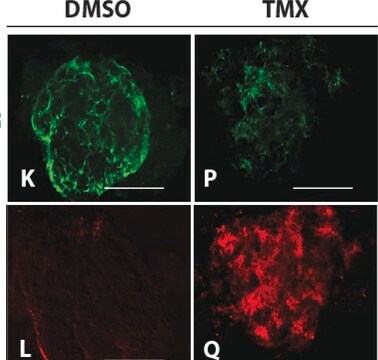N8912
Monoclonal Anti-NG2 antibody produced in mouse
clone 132.38, purified immunoglobulin, buffered aqueous solution
Sinónimos:
Anti-Chondroitin Sulfate Proteoglycan Melanoma-associated, Anti-MCSP, Anti-MCSPG, Anti-MEL-CSPG MSK16 Chondroitin Sulfate Proteoglycan NG2
About This Item
Productos recomendados
biological source
mouse
conjugate
unconjugated
antibody form
purified immunoglobulin
antibody product type
primary antibodies
clone
132.38, monoclonal
form
buffered aqueous solution
species reactivity
rat
technique(s)
immunocytochemistry: suitable
immunoprecipitation (IP): suitable
indirect ELISA: suitable
microarray: suitable
western blot: 1 μg/mL using rat brain neonatal extract
UniProt accession no.
shipped in
dry ice
storage temp.
−20°C
target post-translational modification
unmodified
Gene Information
rat ... Cspg4(81651)
General description
Immunogen
Application
Immunohistochemistry (1 paper)
Western Blotting
Biochem/physiol Actions
Physical form
Disclaimer
¿No encuentra el producto adecuado?
Pruebe nuestro Herramienta de selección de productos.
Optional
Storage Class
10 - Combustible liquids
wgk_germany
WGK 3
flash_point_f
Not applicable
flash_point_c
Not applicable
ppe
Eyeshields, Gloves, multi-purpose combination respirator cartridge (US)
Certificados de análisis (COA)
Busque Certificados de análisis (COA) introduciendo el número de lote del producto. Los números de lote se encuentran en la etiqueta del producto después de las palabras «Lot» o «Batch»
¿Ya tiene este producto?
Encuentre la documentación para los productos que ha comprado recientemente en la Biblioteca de documentos.
Los clientes también vieron
Nuestro equipo de científicos tiene experiencia en todas las áreas de investigación: Ciencias de la vida, Ciencia de los materiales, Síntesis química, Cromatografía, Analítica y muchas otras.
Póngase en contacto con el Servicio técnico






